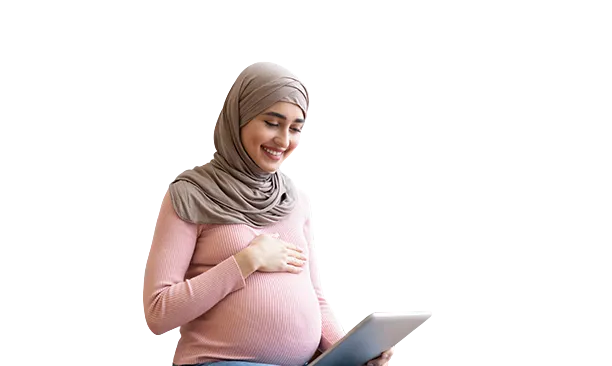
Although exempt, many pregnant women partake in the daily fast. Our Obstetrician/Gynaecologist, suggests ways to do it safely.
The decision to fast during pregnancy is a personal one. Islam gives permission for pregnant women to opt out of fasting if she is worried that it will harm the baby or her own health. “The impact of fasting on a pregnant woman depends on gestation, the stage of pregnancy and also her overall health,” says Dr Daisy Koh, Obstetrician, American Hospital Dubai.
Is fasting safe?
Research is still ongoing in this area and although the evidence is not clear cut, Dr Koh believes it may not be a good idea to fast during pregnancy. “It is not clear if Ramadan fasting is safe for the mother or the baby,” she says. “The evidence is conflicting. Some studies have shown that babies born to mothers who were fasting were slightly smaller than those who weren’t, but other studies showed that there was no difference. Therefore, further well-designed studies are needed to investigate the full impact of Ramadan fasting on maternal and foetal health. Missed days of fasting can be made up at a later date, or a fidyah can be paid by providing food for someone in poverty for every missed day of fasting. “Personally I would not advise pregnant women to fast because we don’t truly know the full impact,” says Dr Koh. “I frequently advise them to fast after delivery and when they are physically able to do. If a woman has family pressure, I would be more than happy to speak to the family too. However, we have to respect a woman’s choices. Ultimately this is a very personal decision and pregnant woman should discuss fasting with her doctor based on her
personal health.”
People find it easy to fast during Ramadan because everyone else is fasting, it’s difficult when you are the only one fasting.
Warning signs
If you are considering taking part in Ramadan during pregnancy, make sure you let your doctor know so that they can offer you advice and perform the necessary health checks. “Watch out for dehydration and stay properly hydrated during the period when you are not fasting,” explains Dr Koh. “Look for signs of dehydration, such as feeling very thirsty, if the urine becomes a very dark colour, or it’s a very small amount. These are the early signs of dehydration and could increase risk of an urinary tract infection. Other signs are headache, feeling dizzy, nausea, and vomiting. If you face any of these signs end the fast. Also, be aware if the movement of the baby has reduced, or changed and contact the doctor immediately. Rest as much as possible and don’t over-exert yourself. “When you’re pregnant the fluid need increases so eat foods that have water content such as porridge, stews, soups, vegetables and fruits. Avoid salty food as this may make you feel even more thirsty, and caffeinated drinks as they are diuretic and will make you dehydrated. Remember to take folic acid and vitamin D.” If you do decide to fast during Ramadan, you may also wish to consider fasting on some but not all days of the month, to make it a bit more manageable. Dr Koh also advises women to avoid overeating. “I tell my patients not to eat for two people because that’s a myth. You should gain maximum 12 to 16 kilos for a normal BMI. When ending the fast do not suddenly consume a lot of sugar. Try to have slow energy releasing foods such as wholemeal pasta, wholemeal bread, or high protein food such as eggs and meats. Avoid acidic food as a lot of women get heartburn very easily.”
Patient Experience